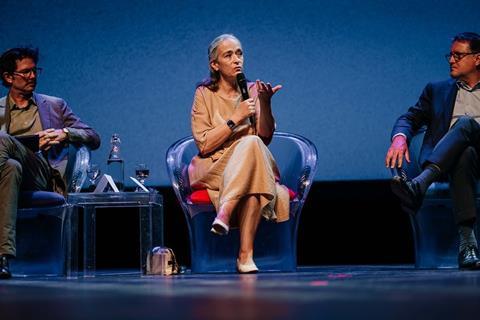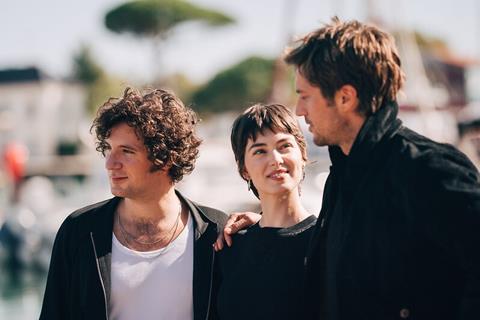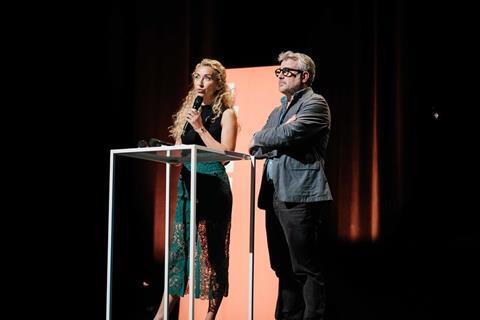Streamer-broadcaster collaborations and rising budgets come under scrutiny but creative energy takes centre stage at Festival de la Fiction
This year’s Festival de la Fiction de La Rochelle took place amid seemingly contradictory signals: the great creative energy of the French and Francophone scripted industry was clear, but there was also a warning that clouds are on the horizon.
The event has become a must-attend for the French scripted industry and this year was no different, with 3,000 professionals heading to La Rochelle. There was, however, a tinge of sadness across the festival following the recent passing of its president, Stéphane Strano, who had been a driving force behind the event’s growth over the past decade.
His enthusiasm, vision, and energy were highly praised, and - reflecting his vision - the festival gave French-speaking countries a bigger stage, hosting line-up presentations for the first time. Professionals also took part in speed-dating sessions with producers and investors.
“We’ve seen a rise in the quality of the works submitted to us,” Festival de la Fiction president and producer, Sophie Revil, tells Broadcast International, adding that screenings also enjoyed strong attendance. “But there are also threats facing our industry - our panel sessions have never been so well-attended.”
Funding body CNC reported positive 2024 figures for French production, while exports also grew for local scripted content even though distributors have reported a more difficult time this year. “But there are major challenges ahead, with concerns about the linear revenues of private broadcasters and worries about public broadcasters,” said the CNC’s recently appointed president Gaëtan Bruel while introducing the Grand Débat Politique panel session.

Collaboration concerns
The subject of the Grand Débat, which gathers together the French industry’s top executives, neatly underlined the fast-moving nature of TV at present, with the session focusing on the recent content deals struck this summer by TF1 and Netflix, and France Télévisions and Amazon.
At the centre of the discussion was the possible disruption of windowing, which has become a key a concern for producers who are worried that the deals will restrict their ability to sell or co-produce shows for a second window with other streamers.
“You’re producing Cat’s Eyes with Amazon, will they still agree to do that?” asked Iris Bucher, head of Quad Drama and president of the producers’ union USPA, directing her question to Rodolphe Belmer, chief exec at TF1, whose channels and shows are set to be carried by Netflix from next year.
Bucher wasn’t the only one asking questions. Simon Arnal, president of fellow producers’ union SPI, and a partner and producer at Haut et Court, added: “We understand the situation. The problem isn’t so much the channels’ distribution, but the fact that some of their shows will be chosen by an algorithm that’s out of control.”
He also reminded France Télévisions’ chief Delphine Ernotte Cunci how displeased she was when Call My Agent! was considered by many to be a Netflix show after it was released by the platform.
Broadcasters defended the deals, outlining the reasons behind them – mainly declining audiences - and playing down any potential negative impact. “The growth of Netflix is affecting the addressable market that enables us to fund your work,” Belmer answered to Bucher. “As for program distribution, it’s already in trouble,” he said, adding that there “is growing pressure on the international market, and it’s not going to get any better.” He agreed, however, that there needed to be further discussion about France’s second window market.
Ernotte Cunci, meanwhile, stressed that France TV’s deal with Amazon was not designed to necessarily grow its audience but rather to compensate for declining reach. “We’re living in a time where absolutely nothing is set in stone,” she said. “Who knows, could [AI search platform] Perplexity offer our content in the future?”.
As for whether the deal with Amazon would affect co-productions with other streamers, the response was simple: “As far as France Télévisions is concerned, we’re only talking about nine co-productions over two years. I’m sure we can find solutions.”
Public pressure
While the Amazon deal attracted much attention, Ernotte Cunci was clear that there were other pressures being faced. “I would like our Amazon deal to be the only concern,” she said, with public radio and TV currently under political attack from the Bolloré group’s media outlets and a far-right party that wants their privatisation.
The France TV boss also shared her worries about future funding issues, with clarity lacking following the recent resignation of French prime minister Francois Bayrou and the effective collapse of his government.
That government had intended to merge France Télévisions and Radio France into a single holding company and has cut funding this year, leaving the broadcaster with a loss. But the plan had also been to ask France Télévisions to cut its drama, documentary, and animation commissioning budget next year by €60m (£52m). “That’s the equivalent to 40 evenings [of TV], or one primetime drama strand,” she said. Her hope is that the next government will not confirm the reforms.
Streaming’s budget boosting
The future of France Télévisions remains a major concern for domestic producers (and international co-production partners), and CNC figures confirmed that the broadcaster remains the country’s biggest scripted player, representing 35.5% of total commissioners’ investment. In comparison, streamers represented 19% last year, the CNC said, becoming a key partner for French scripted content.
CNC’s head of research, Cécile Lacoue, said streamers were largely responsible for the rise in budgets, with total production value of the 1,136 hours produced (up 6% because of more soaps airing via broadcasters) rising 10% to a record €1.2bn, double what it was a decade ago.
In addition to their own originals, streamers were also involved in a dozen shows from traditional broadcasters through pre-buys or co-productions for a first or second window release. CNC research also highlighted that the shows they get involved in are three times more expensive than a broadcaster’s average primetime drama.

The year of HBO Max
While Netflix and Amazon have both made a splash at previous editions of Festival de la Fiction, this year it was the turn of HBO Max.
The streamer received a standing ovation after the premiere of its series Merteuil, the first to be branded an ‘HBO Original’.A prequel to the classic novel Dangerous Liaisons, the period drama reunites movie director Jessica Palud with actress Annamaria Vartolomei, whom she directed in her Maria Schneider biopic, Being Maria.
HBO Max was also involved in four scripted shows from broadcasters at the festival, including M6’s well-received four-part miniseries Belphégor, a new take on the very popular French classic series of the same name.
“It’s the perfect project to partner with a streamer on for the first time,” commented M6’s head of drama, Yasmine Roumane, of the chilling series that takes place at the Louvre Museum.
Meanwhile, France Télévisions said its recently greenlit period miniseries Alice, about the first female (silent) movie director, Alice Guy, would be its first major co-venture with HBO Max.
Female focus
Female-skewing shows and directors were something of a theme in La Rochelle. Disney+, a second-window partner on TF1’s Parisian cabaret series Montmartre, premiered its true crime serial killer drama - Les Disparues de la Glace – at the event.
Like Merteuil, Les Disparues de la Glace is directed by a woman, Virginie Sauveur, suggesting that female directors are gaining access to bigger budgets although panelists at a dedicated session tempered this. The CNC’s 2024 figures showed that women directed 35% of TV scripted works, four points up on 2023, and almost double what it was in 2016.
But during the round table hosted by PFMD (Pour des Femmes dans les Médias), panelists stressed that it is fragile situation. “It starts with having parity in your own team, you need that to build on,” Disney France president Hélène Etzi said.
“Following the introduction of quotas, we now have between 42% and 44% of women directors,” said France TV’s Ernotte Cunci. Panelists also asked for flexibility with quotas, preferring parity within a team rather than per position, even though the number of female technicians has also improved.
Multi-directional partnerships
As the importance of production value continues to grow, the role of partnerships has never been more necessary.
According to the CNC, there was a rise in international co-productions last year, with 60% of French scripted shows receiving some degree of foreign investment.
France was also involved as a minority partner in more international co-productions, including shows such as The Deal, a six-part drama from Switzerland’s Jean-Stéphane Bron exploring the 2015 US-Iran nuclear agreement. The Switzerland/Luxembourg/France co-production was Arte’s flagship premiere at the festival (it won the Buyer’s Choice award at Séries Mania in March).

Relying on relevance
The Deal underlines how broadcasters are looking to deal with a complex geopolitical landscape, with ambitions to both entertain audiences and provide them with shows that resonate with the issues of our time.
“We want series to binge and meditate on,” said Arte’s fiction director Agnès Olier during her line-up presentation. “We are looking for empowering narratives, which are increasingly European, and for talents who bring a fresh perspective.” The public broadcaster, which is looking to develop itself into a Europe-wide platform, is increasing its involvement in European co-productions and announced it will be a partner on Movistar+’s six-part series Killing a Bear from the Sánchez-Cabezudo brothers.
France Télévisions is also looking for both “comfort” shows and riskier series with “unexpected proposals,” according to programme and drama director Anne Holmes. In comedy, the pubcaster won a laugh from the audience with the first images of Bêtes de Flic, about a cop who can suddenly hear animals that give him tips on solving murders.
France Télévisions is also reviving big, eight-part family sagas that look to tackle social issues, such as climate change, with L’or Bleu. Other upcoming series include Jean-Xavier Lestrade’s new show, Des Vivants, about the survivors of the 2015 Bataclan attacks in Paris.
On the international co-production front, it has also stepped in on a show from Belgian platform Streamz set in a future where Flanders has a far-right government and launches a reality gameshow to elect The Best Immigrant.
Francophone alignment
Similar trends were observed at the line-up presentations of French-speaking broadcasters from around the world. Canada’s ICI Radio-Canada Télé is producing series on topics like deepfakes and indoctrination, while Bell Media’s Crave is behind In Memoriam, described as “Succession meets Squid Game” and about a father who challenges his children for their inheritance. “We are looking for shows that can be good conversation starters,” said director of fiction, Sophie Parizeau. The second season of its psychiatric dramedy Empathie (Séries Mania audience award winner) will be co-produced with Canal+.
At Belgium’s RTBF, dystopian series Ethernel is about people communicating with the deceased via transitional objects thanks to AI, while another of the channel’s major projects is Chasseurs de Terroristes, a series about terrorist attacks co-produced with the Nordic’s New8, VRT, Fremantle and HBO Max.
Elsewhere, Switzerland’s RTS (Radio Télévision Suisse) said it is aiming to launch two to three major series per year, with around 18 in development. “That is quite a lot for a population of two million French-speaking inhabitants,” said Patrick Suhner, RTS’s editorial producer. To fund these projects, the broadcaster is developing what he called “exciting partnerships,” highlighted by its participation on The Deal, the multi-language series Winter Palace with Netflix, and the thriller series Intraçables with TF1. “We are looking for shows that can feed people’s minds,” he said.
Indeed, the feeling after four days of line-ups and screenings was that there are more creative opportunities than ever in the scripted space.
Despite funding concerns and growing competition, the sector continues to attract new players. This year, resurfacing with their own company were Jimmy Desmarais and Clémentine Gayet, part of the early Netflix France commissioning team who left the streamer at the end of last year. The two executives have set up Drama Queens, but no group is attached: they want complete creative freedom.








No comments yet